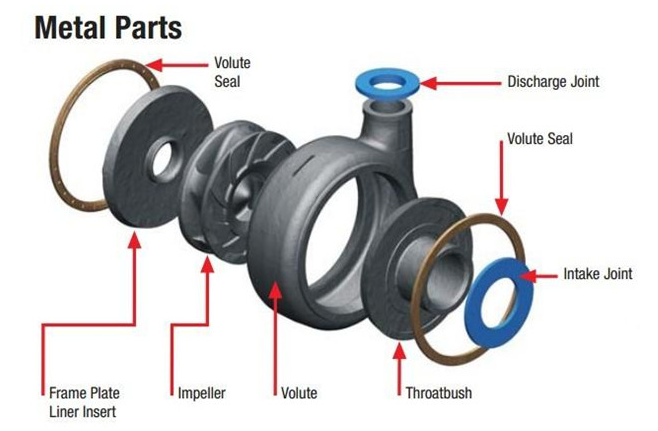1. Naipu Pump offers all metal wet parts with high chrome white iron (27% chrome).The high chrome white iron is a very good wear-resistant material and nice wear-resistant is our slurry pumps important character.

2. Metal Slurry Pump Parts material construction
LINERS
IMPELLER
CASING
BASE
EXPELLER
EXPELLER RING
SHAFT SLEEVE
SEALS
Standard
Chrome Alloy
Chrome Alloy
SG Iron
SG Iron
Chrome Alloy
Chrome Alloy
SG Iron
Rubber
Options
Ferralium
Ferralium
SG Iron
MS
NI Resist
NI Resist
EN56C
Ceramic
Natural Rubber
Natural Rubber
or
SG Iron
or
SG Iron
and
Nitrile
Hastelloy C
316 SS
W151
Polyurethane
Neoprene
Butyl
Viton
Nitrile
EPDM
Hypalon
Hastelloy C
316 SS
W151
Polyurethane
Neoprene
Butyl
Nitrile
Hypalon
Various grades
Fabricated
Cast Iron
Ferralium
Hastelloy C
Polyurethane
316 SS
W151
Ferralium
Hastelloy C
316 SS
Rubber
W151
Polyurethane
Neoprene
Butyl
Nitrile
Ferralium
Hastelloy C
Titanium
316 SS
304 SS
Stellite
Chrome Oxide
Nordel
Neoprene
Viton
Pump Parts,Slurry Pump Metal Parts,Metal Slurry Pump Parts,Slurry Pump Fluid Parts,Slurry Pump Wet Parts
Shijiazhuang Naipu Pump Co., Ltd. , https://www.naipu-pump.com
